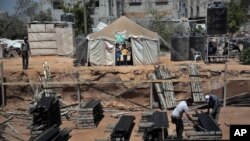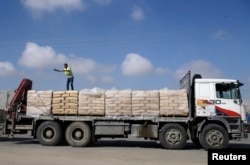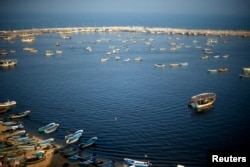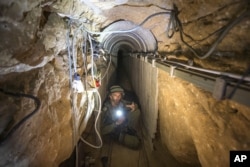For years, Israel tried to erode Hamas’ grip on the Gaza Strip. Officials calculated what Gazans needed for survival and let in little else. Records show that sometimes pasta, notebooks and musical instruments were banned.
Israeli leaders eventually realized that Hamas’ downfall could lead to chaos or the rise of a more radical Jihadist group. So Israel is now easing up on the strip’s economy.
“We do understand that a deep and whole recovery of the Gaza Strip is essential for stability,” army Deputy Chief of General Staff Major General Yair Golan, told reporters.
Some 700 to 800 trucks a day carry goods to the Kerem Shalom Crossing. There, security checks are supposed to catch every item that could serve Hamas’ military purposes. Palestinian trucks then carry the goods into the strip.
Meanwhile, officials are debating the kind of a port Gaza might have.
“The economy cannot survive without being connected to the outside world,” the World Bank’s Country Director for the West Bank and the Gaza Strip Steen Lau Jorgensen said in a recent report.
Israel maintains a naval blockade on Gaza, but lets the Palestinians use its port of Ashdod. Israeli and Palestinian economists found Ashdod time consuming and expensive.
Because of bureaucracy, security checks and transportation requirements it takes a Palestinian-bound container 38 days to reach its destination, compared to 10 days for a delivery in Israel. The costs are more than double.
Israeli-Palestinian agreements provided for a port in Gaza and work began in 2000, but the Israelis bombed the site during the Second Intifada.
Starting again there would boost Gaza’s economy. Investors have avoided the strip because it is a high risk area with occasional outbursts of hostilities, noted Palestinian economist Saeb Khatib.
A port would provide tens of thousands of jobs, easing unemployment, which has reached 45 percent, according to the World Bank. Gazans can not work abroad because the strip’s borders are closed.
Security concerns
Such a port would, some say, endanger Israel’s security. Gaza’s experienced tunnel diggers could open an underground arms smuggling channel, they say.
Moreover, Israeli officials want their inspectors to check the shipments, but such inspectors would risk their lives if they enter the strip.
Israel’s experience with European Union observers several years ago was also problematic. From their side of the border, Israelis monitored the Rapha Crossing between Egypt and Gaza. They alerted EU representatives at the crossing whenever Palestinian officials seemed to violate agreed regulations, but the observers were not enforcers.
Mark Gallagher, who heads the political section at the European Union’s delegation to Israel, acknowledged that, “If they [the Palestinians] let something out, they let something out.”
But there are few alternatives.
Boarding ships at sea to check their cargo is no solution. It is impossible to thoroughly check a ship carrying thousands of containers.
Other suggestions talked of unloading cargoes in Cyprus or Egypt, checking them there and letting a trusted third party deliver them to Gaza.
Israeli Transport Minister Israel Katz is pushing for construction of an artificial island some 4.5 kilometers off Gaza’s coast and a bridge linking it to the shore. The eight-square-kilometer island should be under an international regime, Katz told a conference at the Ruppin Academic Center. Imports would be checked in accordance with Israeli standards.
It would be an expensive project, with estimates it would cost $7 billion to $10 billion.
Hamas a political problem
A key problem would be political. Hamas wants a port, but rejects U.S., European Union, Russian and United Nations demands that it commit itself to non-violence.
“If we give Hamas [a port], we will strengthen Hamas versus the Palestinian Authority... Hamastan will become a sovereign entity,” Amos Gilad, who heads the Israeli defense ministry’s political-military affairs branch, warned in an address at the Hebrew University’s Truman Center.
The Palestinian Authority wants the port to be part of an independent state encompassing the West Bank and the Gaza Strip, and not under Hamas, noted former Palestinian minister Ashraf al-Ajrami.
“It would be a symbol of Palestinian sovereignty,” he said.
Israel’s decision could affect the internal Palestinian power contest.
Professor Matti Steinberg, an Israeli expert on Palestinian affairs, noted that Israel’s withdrawal from Gaza in 2005 helped Hamas win the 2006 elections. Hamas argued its attacks forced Israel out, not Palestinian President Mahmoud Abbas’ no-violence policy.
Minister Katz said he is confident of “a sweeping majority” in the Cabinet for his initiative, if Prime Minister Benjamin Netanyahu would bring it up.
“I know that. I am not guessing,” he told the VOA. Agriculture Minister Uri Ariel said he had discussed the matter with Netanyahu, who said he was considering it.







